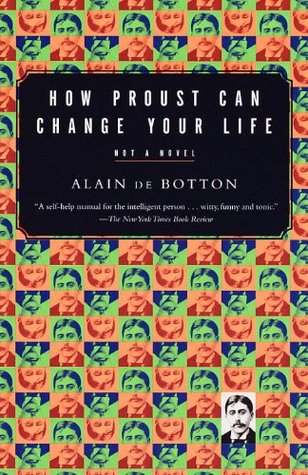More on this book
Community
Kindle Notes & Highlights
Read between
August 2 - September 17, 2019
I think that life would suddenly seem wonderful to us if we were threatened to die as you say. Just think of how many projects, travels, love affairs, studies, it—our life—hides from us, made invisible by our laziness which, certain of a future, delays them incessantly.
how to stop wasting time and start to appreciate life.
In reality, every reader is, while he is reading, the reader of his own self. The writer’s work is merely a kind of optical instrument which he offers to the reader to enable him to discern what, without this book, he would perhaps never have experienced in himself. And the recognition by the reader in his own self of what the book says is the proof of its veracity.
When two people part it is the one who is not in love who makes the tender speeches.
“The sad thing is that people have to be very ill or have broken a leg in order to have the opportunity to read In Search of Lost Time.”
“one must never miss an opportunity of quoting things by others which are always more interesting than those one thinks up oneself
n’allez pas trop vite.
“My only consolation when I am really sad is to love and to be loved,”
“Those who love and those who are happy are not the same.”
“suspended between caffeine, aspirin, asthma, angina pectoris, and, altogether between life and death every six days out of seven.”
feeling things (which usually means feeling them painfully) is at some level linked to the acquisition of knowledge.
being jilted by a lover is a perfect introduction to the mechanisms of emotional dependency.
In fact, in Proust’s view, we don’t really learn anything properly until there is a problem, until we are in pain, until something fails to go as we had hoped.
We cannot be taught wisdom, we have to discover it for ourselves by a journey which no one can undertake for us, an effort which no one can spare us.
“Happiness is good for the body,” Proust tells us, “but it is grief which develops the strengths of the mind.”
better off pursuing tormented love affairs than reading Plato or Spinoza.
Pain is surprising: we cannot understand why we have been abandoned in love or left off an invitation list, why we are unable to sleep at night or wander through pollinating meadows in spring.
Griefs, at the moment when they change into ideas, lose some of their power to injure our heart.
Because we always lack more than we have, and because there are always more people who don’t invite us than who do.
To recognize that our best chance of contentment lies in taking up the wisdom offered to us in coded form through our coughs, allergies, social gaffes, and emotional betrayals, and to avoid the ingratitude of those who blame the peas, the bores, the time, and the weather.
Clichés are detrimental insofar as they inspire us to believe that they adequately describe a situation while merely grazing its surface. And if this matters, it is because the way we speak is ultimately linked to the way we feel, because how we describe the world must at some level reflect how we first experience it.
A book is the product of another self to the one we display in our habits, in society, in our vices.
“I feel infinite sadness at seeing how few people are genuinely kind,”
(“My only consolation when I am really sad is to love and to be loved”).
Human beings sometimes interest me but I don’t like them because they are not intelligent enough.”
“Love is a trap and only reveals itself to us by making us suffer.”
In reading, friendship is suddenly brought back to its original purity. There is no false amiability with books. If we spend the evening with these friends, it is because we genuinely want to.
It just appears natural to be struck by the beauty of some things and to be left cold by others.
our dissatisfactions may be the result of failing to look properly at our lives rather than the result of anything inherently deficient about them.
The reason why life may be judged to be trivial although at certain moments it seems to us so beautiful is that we form our judgement, ordinarily, not on the evidence of life itself but of those quite different images which preserve nothing of life—and therefore we judge it disparagingly.
True beauty is indeed the one thing incapable of answering the expectations of an over-romantic imagination.…
There is no doubt that a person’s charms are less frequently a cause of love than a remark such as: “No, this evening I shan’t be free.”
Like every obstacle in the way of possessing something…, poverty, more generous than opulence, gives women far more than the clothes they cannot afford to buy: the desire for those clothes which creates a genuine, detailed, thorough knowledge of them.
imaginative possession
“there is no better way of coming to be aware of what one feels oneself than by trying to recreate in oneself what a master has felt.”
Reading is on the threshold of the spiritual life; it can introduce us to it: it does not constitute it.
Men often want to love, without managing to do so: they seek their own ruin without being able to attain it, and, if I can put it thus, they are forced against their will to remain free.


